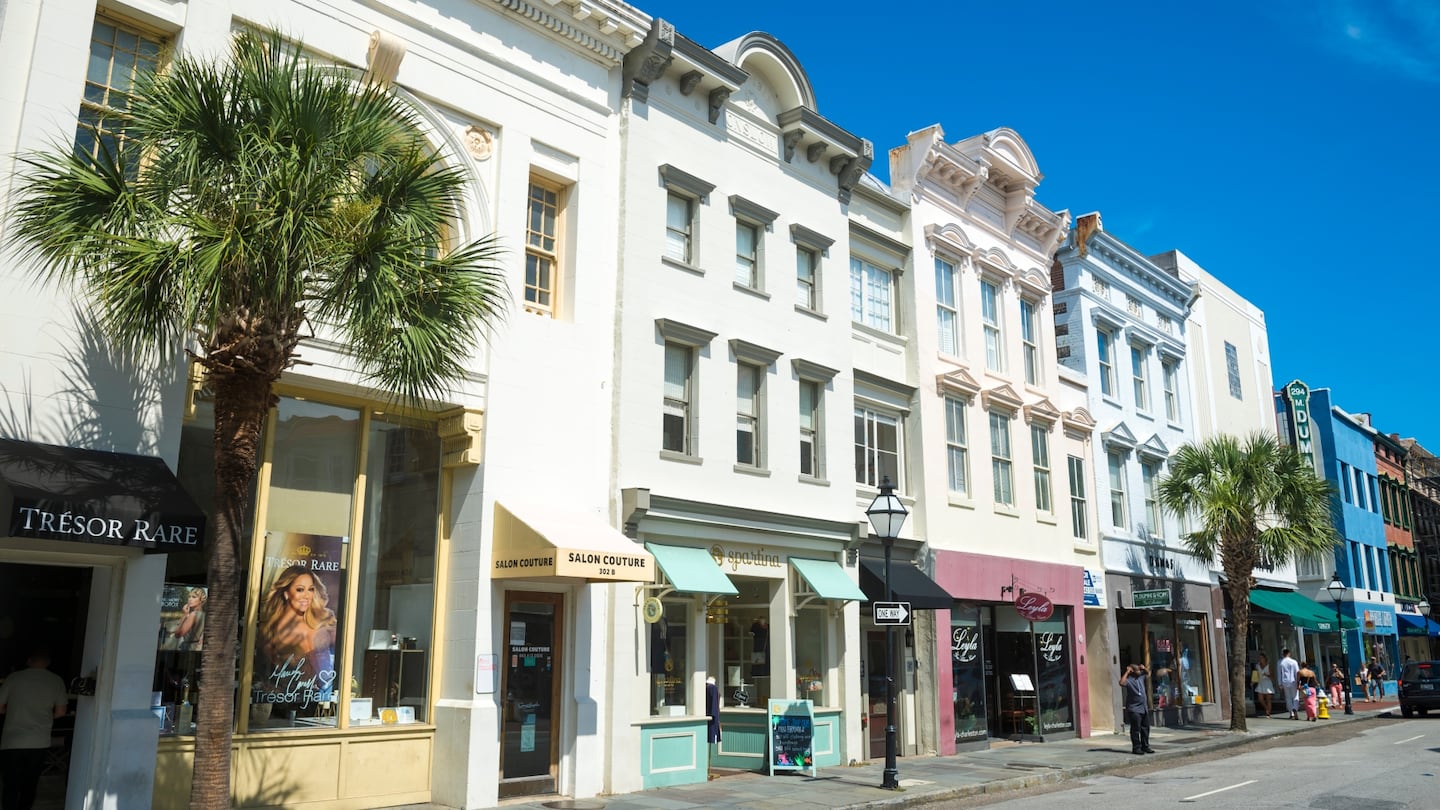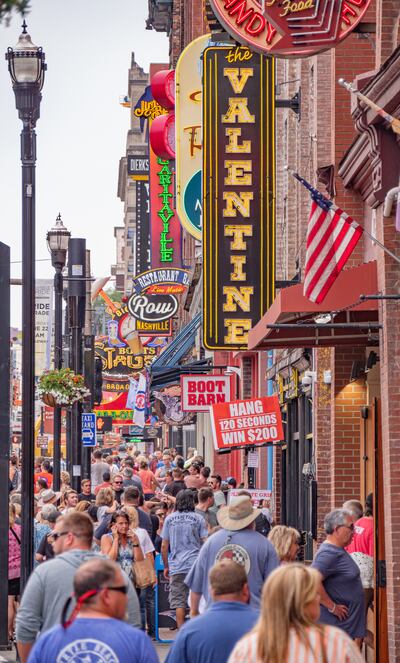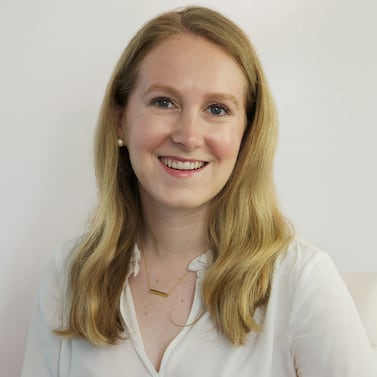
The Business of Fashion
Agenda-setting intelligence, analysis and advice for the global fashion community.

Agenda-setting intelligence, analysis and advice for the global fashion community.

Last week, Kering chief executive François-Henri Pinault added two new metropolises to the list of global cities where brands like Gucci and Balenciaga are eyeing expansion: Atlanta and Nashville.
“These cities have changed structurally, it’s not just a spike,” Pinault said, adding that he had recently visited both on a scouting trip.
The cities, along with a handful of others below the Mason-Dixon line, including Charleston, S.C., have been bubbling just under the global luxury industry’s radar for years. But it was during the pandemic that the American South solidified its status as a magnet for the wealthy professionals, celebrities, tourists and influencers who make up high-end brands’ best customers.
What’s followed is a flurry of store openings and events, sometimes bringing labels to the region for the first time outside of department stores and other multi-brand boutiques. Until Balenciaga opened its store in Atlanta last year, the brand’s nearest boutique was over 600 miles away in the outskirts of Washington, D.C. Also within the past year, The RealReal landed in Atlanta, LoveShackFancy in Charleston and Breitling in Nashville.
ADVERTISEMENT
Southerners have always had money. But while they are perceived as dressing well — and paying full price to do so — the stereotype is that they do so out of step with global trends. (Think cowboy boots and Lilly Pulitzer prints.)
Now, they’re shedding that perception, thanks to Atlanta taking off as a popular location for Hollywood films, influencers flocking to Charleston’s Instagrammable architecture and restaurants, and Nashville’s country music scene producing crossover stars like Taylor Swift and Kacey Musgraves.
“Nashville really didn’t believe it was cool until other people started telling us we are,” said Libby Callaway, founder of the public relations firm The Callaway, who as a stylist in the late aughts struggled to convince major fashion houses to dress country stars. “In Nashville loosening up a little bit, the outside world has come to realise that it’s a little bit cooler than they thought it was.”
Tourists and Residents
While historically America’s poorest region, the South has seen incomes in some of its biggest cities rising faster than the US average for years. Nashville’s median income surpassed the US average in 2015 and topped $70,000 for the first time in 2019, the last year US Census data is available. Charleston followed a similar trajectory.
“It’s a destination and we have a strong consumer base there,” David Liu, co-founder of the leather goods brand Leatherology, which hosted pop-ups in Nashville and Charleston over the past year, said of the two cities. “It’s that perfect blend of both things.”
Atlanta has a longer history as the South’s economic hub (Delta Air Lines and Home Depot are headquartered there, and the city is home to America’s busiest airport). It’s also served as home to large numbers of Black professionals, academics and entrepreneurs since the 19th century, fashion designers among them. The Black Fashion Movement, an organisation that supports Black-owned brands, hosted a showcase for 22 designers last October.

It’s not just a growing number of tourists that are arriving in these cities, but also new permanent residents, drawn by lower taxes, warm weather and cheaper real estate.
ADVERTISEMENT
“Every day, I’m meeting someone who has just moved there,” said Stacy Smallwood, the founder of Charleston-based boutique Hampden Clothing. “It’s been really fun and exciting, and that explosion [of people] has grown our business tremendously.”
Charleston, in particular, has seen a number of high-profile fashion influencers land in the city, including Julia Berolzheimer and Grace Atwood. With a more bustling influencer scene, brands — in particular direct-to-consumer players — have come flocking, too, changing the South’s style sensibility.
“There’s definitely a lot of money, and people are willing to spend,” said Atwood, who relocated to Charleston from New York in 2021. “I go to events and I’m blown away by how well-dressed the women are.”
But without the same level of activity as larger cities, shoppers still get excited about the same store openings and events that might be commonplace in New York. Eugene Rabkin, the co-founder of Atlanta-based store ANT/DOTE, said that it was when he attended a packed event hosted by Dutch designer Iris van Herpen in the city that he realised Atlanta’s appetite for fashion.
“It retains this kind of enthusiasm for fashion, whereas when I think of LA or New York, these cities are really saturated with retail, and Atlanta is not,” he said. “Fashion and retail haven’t caught up to it yet.”
They’re getting there. Sid Mashburn, who along with his wife Ann runs namesake apparel and accessory brands Sid Mashburn and Ann Mashburn, said that they’ve been approached by publications from outside the region that hoped to reach more southern consumers by using the brand as “our emissary to the southeast.”
Southern Hospitality
When brands do arrive, they find themselves operating in a friendly business environment that allows for a deeper relationship with consumers. Smallwood said that she’ll send out personalised orders to clients who visited the physical Hampden store months or even years ago.
ADVERTISEMENT
“All these cities come with their own second helping of service and hospitality,” said Mashburn. “When you walk into our stores, you’re not a stranger. We’re like, ‘Hey, come on in, do you want a Coke or a beer? Make yourself at home.’”
As well, the market hasn’t yet become so saturated that smaller, local players are gobbled up by out-of-town retailers.
“We stand out as a destination on King Street, the main shopping street, and there’s no department store there,” said Smallwood. “So we’re able to offer really this vast array of assortment, 175 designers, and become the shopping destination of Charleston.”
Brands are paying these cities more special attention, too. Swimwear brand Marysia, for example, introduced its athleisure brand with a Charleston influencer event (founder Marysia Reeves launched the brand in the city in 2009) and bridal site Over The Moon celebrated its collaboration with Brock Collection with a dinner at the city’s Gibbes Museum of Art.
“Brands really just see it as a little gem,” said Jackie Thomson, founder of Of Counsel, a Charleston-based public relations firm. “It doesn’t feel insular and closed off. We’ll introduce you to the right people who will really create and foster genuine relationships for your brand. That resonates.”
As well, with the decline of department stores and the pandemic prompting brick-and-mortar retail shakeups across the US, there’s been more opportunity for interested brands to open their doors down south.
“Twenty years ago, it was more like boutiques and mom-and-pop shops. Then we went through this period where it was very commercialised,” said Jaimie Dewberry, the co-owner of Charleston’s Dewberry Hotel. “Now, I feel like we’re getting back to having truly special boutique experiences on King Street.”
However, in Pinault’s view there is still a dearth of spaces in the South that can support luxury brands. “There’s still some work to do to convince the landlords to get the malls back at the right level,” he said.
The cities themselves have recognised the value of their burgeoning fashion industries and want to encourage their further potential: Atlanta-based designer Tracey Nicole said she received a grant for her business from the city of Atlanta.
“When you see the entertainment industry grow as big as it has, where so many movies are being shot here in Atlanta, why wouldn’t the fashion scene grow just as big?” said Nicole.
Young, wealthy professionals have flooded Miami and Austin over the last 18 months, and luxury brands are following the money. But selling to a newly minted tech millionaire isn’t always so simple.
Once synonymous with rhinestones and cowboy boots, a growing number of emerging fashion labels have turned Music City into a thriving fashion hub.
American luxury retail has changed, but customers are still hungry for the special feeling only an exceptional multi-brand store can offer. Can a crop of upstarts and a few savvy incumbents succeed where others have failed?

Diana Pearl is News and Features Editor at The Business of Fashion. She is based in New York and drives BoF’s marketing and media coverage.
As the German sportswear giant taps surging demand for its Samba and Gazelle sneakers, it’s also taking steps to spread its bets ahead of peak interest.
A profitable, multi-trillion dollar fashion industry populated with brands that generate minimal economic and environmental waste is within our reach, argues Lawrence Lenihan.
RFID technology has made self-checkout far more efficient than traditional scanning kiosks at retailers like Zara and Uniqlo, but the industry at large hesitates to fully embrace the innovation over concerns of theft and customer engagement.
The company has continued to struggle with growing “at scale” and issued a warning in February that revenue may not start increasing again until the fourth quarter.